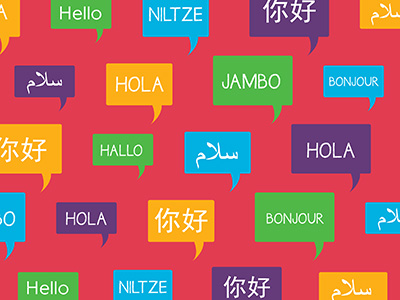Celebrating bi/multilingualism among our learners

By Fatima Rivera
April holds special significance for bi/multilingual learners in the United States, as it is National Bilingual/Multilingual Learner Advocacy Month. This month provides an opportunity for us to celebrate the diversity of languages spoken around the world, promote inclusivity in learning, and advocate for the support and rights of multilingual learners.
Multilingualism not only promotes cross-cultural understanding but also offers a range of social, cognitive, and economic benefits (Martinez, 2018). Multilingual learner advocacy ties in nicely with WIDA’s mission of advancing academic language development for children who are linguistically and culturally diverse. When we promote the value of multilingualism, we contribute to efforts that create a more equitable society that celebrates linguistic diversity.
The WIDA Español program advocates for bi/multilingual learners by providing resources and professional development opportunities for educators who work with Spanish-speaking students. The goal of these efforts is to help students develop their language proficiency in Spanish, similar to the ways in which WIDA supports English language learners in acquiring proficiency in English. The WIDA Español program includes the Marco DALE and Marco ALE as frameworks for Spanish language instruction with resources designed to meet the diverse needs of Spanish language learners in various educational contexts.
The world is becoming increasingly interconnected, and multilingualism has become an asset with numerous benefits, both personal and professional (Escamilla et al., 2021). Being proficient in more than one language enhances cognitive abilities, such as memory, attention, and problem-solving skills, and promotes a deeper understanding of different cultures and perspectives (Martinez, 2018). Multilingual individuals have an enhanced ability to communicate with people from diverse backgrounds and bridge cultural gaps.
As someone who grew up as a multilingual learner, I understand the significance of language learning in today's society. Learning English at school, while being raised in a Spanish-speaking household has opened a world of personal and professional possibilities for me. Being able to speak multiple languages has allowed me to communicate and connect with a much wider range of people and has given me more professional opportunities, and a deeper appreciation for different cultures and perspectives.
I had the opportunity to work for the WIDA International Program as an International Program Specialist for four years. During my time there, I learned from global educators about the importance of advocating for students. Working with global educators also gave me the opportunity to hear different perspectives from a diverse intersection of people, cultures, and economies. International educators saw the importance of learning a second language; they emphasized that bilingualism enhances cognitive abilities and provides more opportunities for personal and professional growth.
Teachers from WIDA international schools would stress that students who are fluent in more than one language tend to possess better communication skills overall and are equipped to navigate multicultural environments with ease. Being able to communicate with people from different cultural backgrounds allows bilingual [and multilingual] individuals to understand and appreciate the nuances of different cultures, which develops positive relations in diverse communities (Martinez, 2018).
As we celebrate Bi/Multilingual Learner Advocacy Month, let us reflect on the value of linguistic diversity and the positive impact it can have on individuals and society. By advocating for the rights and support of bi/multilingual learners, we contribute to a world where everyone is empowered to express themselves in the language in which they feel most comfortable, fostering a sense of belonging and unity. Through collective efforts, we can create a future where linguistic diversity is not only recognized but also celebrated.
Bibliography
Escamilla, K., Hopewell, S., & Slavick, J. (2021). Teaching (bi) multilingual learners: Connecting languages. The Reading Teacher, 75(3), 363-371.
Halsband, U. (2006). Bilingual and multilingual language processing. Journal of Physiology-Paris, 99(4-6), 355-369.
Martínez, R. A. (2018). Beyond the English learner label: Recognizing the richness of bi/multilingual students’ linguistic repertoires. The Reading Teacher, 71(5), 515-522.
Author
Fatima Rivera is the WIDA Español coordinator. In her role, Fatima is responsible for outreach and coordination of WIDA Español events with internal and external stakeholders, managing communication vehicles for WIDA Español, and supporting administrative needs of the WIDA Español program.





